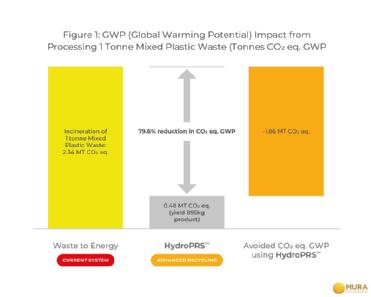WMG News - Latest news from WMG
Sustainable, low carbon circular plastic economy enabled by advanced plastic recycling process
New research shows an 80% reduction in global warming potential (GWP), when compared to incineration, by processing waste plastic via a unique advanced recycling solution known as HydroPRS™, in a paper published by experts at WMG, University of Warwick.
solution known as HydroPRS™, in a paper published by experts at WMG, University of Warwick.
Researchers from WMG’s Sustainable Materials and Manufacturing team have been working with Mura Technology on a project focusing on the advanced recycling industry and the environmental impact of the associated processes.
Advanced recycling technologies (also known as chemical recycling) include a range of processes that break plastics down, converting them into hydrocarbon products that can replace the virgin fossil feedstocks used by the chemicals industry to create new plastics and other industrial products such as asphalt.
Dr Stuart Coles, Reader of Sustainable Materials and Manufacturing at WMG, University of Warwick, explained: “Advanced recycling will play an important role in realising the circular economy of plastics. The work conducted at WMG demonstrates a clear pathway towards Net Zero in recycled plastics and highlights improvements on the environmental footprint when compared with both existing production and disposal routes.
“We are delighted to see this work published as we explore the full potential of this technology moving forward.”
The peer-reviewed Life Cycle Assessment (LCA), reports that significantly reduced carbon emissions (measured as GWP in kilograms of CO2 equivalents) can be achieved if waste plastic is diverted towards HydroPRS™ and away from waste incineration – a comparable end of life treatment and currently, the fate of many ‘unrecyclable’ plastics.
Pioneered by Mura Technology, HydroPRS™, unlike pyrolysis, utilises supercritical water to convert post-consumer flexible, multi-layered and rigid plastics into high yields of stable, premium petrochemical feedstocks. Importantly, the products produced in the HydroPRS™ process were found in the LCA to have at least a comparable GWP when compared with naphtha, the fossil oil-based feedstock used in the production of plastics.
Dr Steve Mahon, Mura Technology’s CEO, said: “Resolving the global plastics crisis while reducing carbon emissions globally will inextricably require that the world is able to substitute fossil-based naphtha and other hydrocarbons for more sustainable feedstocks. This is Mura Technology’s ultimate goal and our innately scalable, innovative advanced recycling process using supercritical water is uniquely placed to pave the way to enable a low-carbon global circular plastics economy.”
Currently, the fate of unrecycled waste plastics is landfill, incineration or leakage into our waterways and oceans. All have negative impacts on the environment. Whilst incineration recovers some energy from plastic, none of these processes keep material within the circular economy, which in turn sustains the demand for virgin plastic from fossil-based sources.
Mura’s Chief Sustainability Officer, Dr Geoff Brighty, added: “As the global economy transitions away from fossil fuels, circular economies must operate at as low an environmental cost as possible. Alongside using the LCA to identify process improvements, the WMG team have demonstrated a clear, deliverable pathway to Net Zero for the HydroPRS™ process. This will help Mura decarbonise the petrochemical sector, whilst also reducing demand for fossil oil for plastic production by regenerating plastic waste into their feedstocks.”
The LCA is focussed on Mura’s first site in Teesside, UK and was funded through Innovate UK’s Smart Sustainable Plastic Packaging challenge (SSPP), as part of one of the demonstrator projects (grant number 49801).
Read the Hydrothermal Treatment of Waste Plastics: An Environmental Impact Study paper in full here s10924-023-02792-3.pdf (springer.com)
